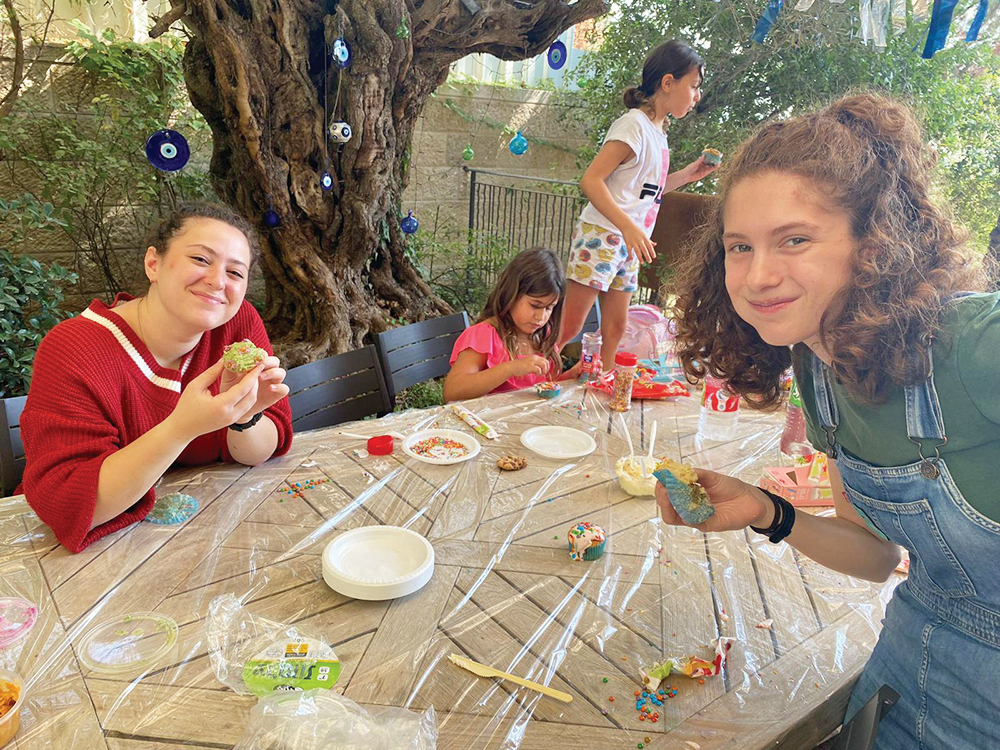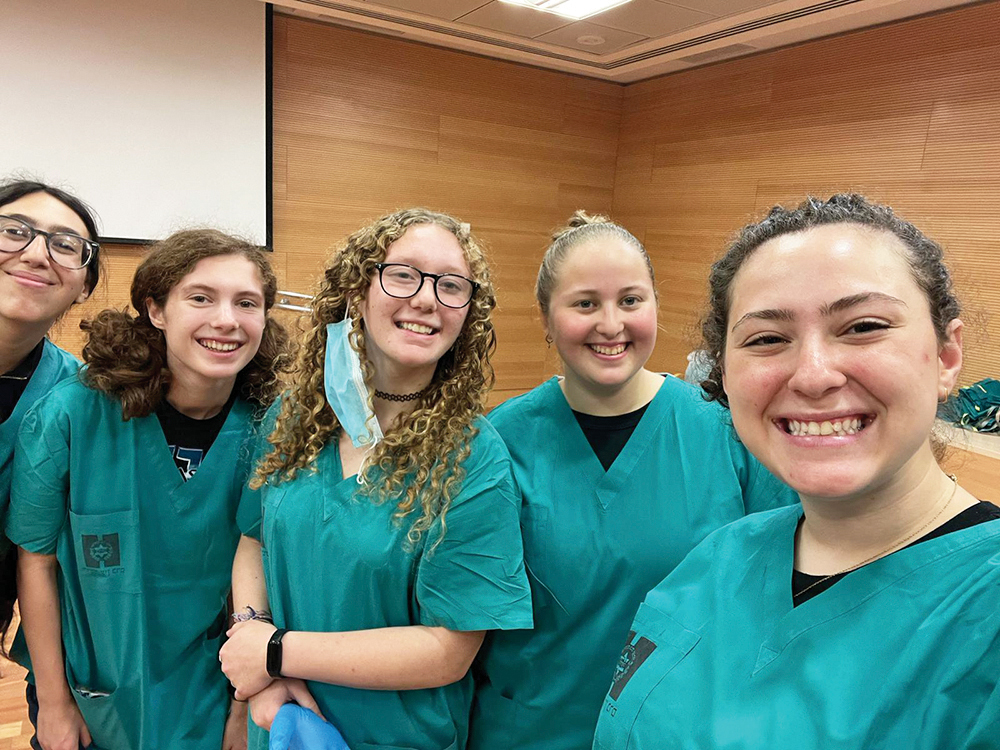
Despite the challenges brought on by the Israel-Hamas conflict, Eliana Birman is fostering a deep connection to learning at Midreshet Amudim in Jerusalem. Birman grew up attending Congregation Rinat Yisrael in Teaneck and went to Yeshivat Noam for elementary school before going to Frisch for high school. After seminary she will be attending Barnard College.
Below is a conversation between The Jewish Link and Birman.
Why were you drawn to Amudim, and what makes it different from all the other programs you considered?
To me, Amudim was just the most genuine place that I could find. Everyone that I heard went there and everyone I could find was just so invested in learning and answering all the questions they had about Judaism, about God, and about religion as a whole. I just felt like it was a really good place for me to be able to answer questions and ask my own questions. It really drew me to it.
How do you think Amudim fits your personality and your own philosophical outlook?
I’ve always been a very inquisitive person and I’ve always had a lot of questions I wanted to answer. When I am in a situation where I’m only learning things on a surface level I can’t really answer those questions fully. But I’ve always had a lot of questions and I think Amudim is a really good place to get into philosophy and different approaches to answering questions. We use Torah and secular sources and dive deep to answer questions. I really like that; it’s very satisfying to me.
Is there any particular teacher that you personally connect with?
Rabbanit Leora Balinsky-Glauber. I’m in her Gemara shiur, and her other two classes, “God’s Guide to God,” about the 13 Middot HaRachamim, and “Chasidut on the Parsha.” She’s so friendly and relatable and she really knows how to connect to the students and I think that’s part of what makes her such an amazing teacher. She’s fun, energetic and she’s really able to read how we are feeling and teach based on that.
Why do you like those classes?
I was always in honors Gemara in high school, but I never really connected to the material. I always felt like I was just learning to keep up and to do well on the test. For the first time I really feel like I’m enjoying learning Gemara. I’m actually understanding what’s going on and connecting to it. I’m really trying to get what the words mean and what the concepts are and I really enjoy approaching Gemara with a more mature perspective.

One thing I love about “Chasidut on the Parsha” is that we always start and end by singing a niggun. We always start by singing whichever one we learned the last week, and at the end we learn one from whoever’s Torah we learned that week. “God’s Guide to God” has been really interesting because we have really delved into a piece that I’ve never really thought about before.
What were your expectations going into Amudim and how have they differed from your actual experience at Amudim?
I came from a very big community and have been in big schools my whole life, so I was really nervous about being in a school with fewer than 20 people. I was scared that I wouldn’t be able to connect to people and wouldn’t have as many options for people to connect with. But because it’s so small, really everyone is friends with each other, there are no cliques or friend groups, we are like one big family. Everything going on has also really brought us together.
What’s a goal you had coming into the year?
I’ve always liked learning but I was just learning to do well on a test. Here, I am choosing to learn and to be here. The only consequence of me not being in class is me missing out, but I don’t want to miss out. I really do want to learn more about all the things I’ve always taken for granted.
Outside of learning, what else have you enjoyed doing in Israel?
Honestly, I had really enjoyed learning how the bus system works and just traveling around. Every time that I’ve been to Israel with my family we didn’t go so far. I didn’t really know so many places in Israel so I’ve been going out for Shabbat and out with friends. It is really nice to feel independent and actually explore on my own. For now, I have been having meals with friends in our apartment.
What has Shabbat looked like for you so far, and going forward?
Erev Shabbat everyone hangs out in the apartment together and we all get ready and excited for Shabbat together. Then I meet up with whoever I’m going out with and pull up Moovit to get ready and try to figure it out. So far I’ve visited family in Ramat Beit Shemesh and Givat Zeev.
Our second in-Shabbat we had a potluck dinner in our apartment. We all just sat around the table doing icebreakers and getting to know each other with dishes from home that I had never tried before. Some friends and I plan to do that for the next few weeks. Things are settling down but I still feel safer in my own apartment for now.
What has been the highlight of your year so far?
Yom Kippur. The whole midrasha went out to the Rosh Midrashas house in Beit Shemesh. We were all staying at places nearby but we all davened at the Rosh Midrasha’s house. It was really, really beautiful. It was pretty much just the girls from the midrasha, a minyan and a few other women from the community. It was really nice to be able to hear my own voice on Yom Kippur and not be in a shul with a lot of people I don’t really know. It was nice to daven loudly and feel very connected to it.

How do you think this year will prepare you for the rest of your life?
One thing that it’s preparing me for is learning how to balance living independently and also being in class, since at Amudim we are in class from 9 a.m.-10 p.m. I really have to learn how to take time to go grocery shopping and to clean my apartment while also being engaged in learning for most of the day. It’s also just teaching me that I can learn on my own and it doesn’t need to be structured learning. Even when I am not in class I’m taking books out of the library for Shabbos and free time. It’s really teaching me how to learn in my everyday life. Especially with the conflict, I’m learning how to navigate unexpected challenges. It’s also been really amazing to see the Jewish community come together, and I’m excited to carry on what I have learned into college next year.
On living independently, what has that experience been like?
I have always shared a room with my twin sister but knew how to live with her. Now, living in a room with two other people, and an apartment with four other people, it has been very interesting learning how to share the space and have my own space. Learning how to keep it clean and neat, learning how to respectfully communicate about everyone being on top of their responsibilities. We don’t have anyone cleaning or cooking for us so it’s really nice that we are all learning how to live together and I’ve really enjoyed it.
How has the Israel-Hamas conflict changed your gap year?
For the first week of the war, we had classes in our apartments. It was really strange but people didn’t really feel safe walking the eight minutes to the midrasha. Now we’ve gone back to learning in the midrasha, but our days are often filled with chesed opportunities like volunteering at Hadassah Hospital and at JLIC camp for children who have been displaced from the south. Everyone has been feeling very emotionally drained and things have definitely been hard, but we’re all motivated to find meaning in the hardship and it pushes us to give our all when it comes to learning and chesed. We’re having two siyumim this week—one for a masechet of Mishna and one for Shnayim Mikra.
How are you handling these changes?
It’s definitely been hard for me to detach myself from thinking about the war and focus on learning, especially because I have family in the army, but I know that my presence in Israel and at Amudim specifically is making a difference. It’s really important to me not to let this year pass me by even though it’s very different than I expected. But it’s been inspirational to see the Jewish community come together like this to support the IDF and our fellow Jews.
Would you like to share a particular event that inspired you?
Yeah, sure. The day the war started, our neighbors invited us to davening and a meal in a school with a shelter. There were supposed to be many more people there, but families were scared to come and many people had been called to Miluim. We didn’t have any food as it was all left at the Midrasha where we were supposed to eat, so we accepted the neighbor’s invitation. Despite the sirens, kids were running around on the playground as a robust davening went on inside. The moment the kehilla sang “Hamalach Hagoel” under the tallit, everyone was so emotional and sang it with their whole hearts. We then ate a really nice meal with everybody at the school.
How do you feel you are making a difference?
Well, I don’t know exactly why it feels important for me to be here but it does. But also in a physical sense—we’ve been volunteering and doing chesed on the ground and you can’t do that anywhere else.
Sam Savetsky of Bergenfield is a shana bet student currently studying at Yeshivat Migdal HaTorah in Modi’in.








